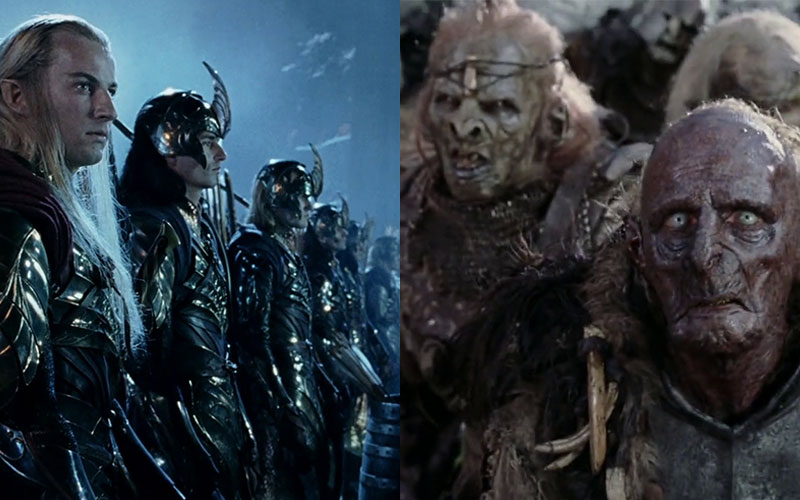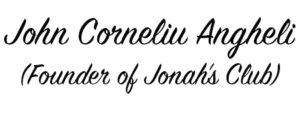[videopress LVDaOk1s]
A Note From the Underground *
 Have you ever seen the film, 300?
Have you ever seen the film, 300?
This is the story of 300 Spartans, who under the leadership of King Leonidas, dared to stand up to the entire army of the Persian Empire, which numbered between 100,000 and 150,000 thousand soldiers.
For all the exaggerated glitz and spectacle that this film showcased, what is most extraordinary, is that it’s based on a true story. It happened. It was the Battle of Thermopylae, of September 480BC in Greece.
One important thing that made a battle like this possible was the geography. The Persian Army, in order to reach their destination, they had to go through a narrow passageway, with cliffs on both sides.
So rather than just being able to surround the Spartan soldiers and to overwhelm them with a hail of arrows, the Persian Army was forced to attack them head on, in hand-to-hand combat.
But it was shocking result. This small band of Spartans fought for seven days and decimated an estimated 20,000 soldiers in the process.
No one really knows if those Spartans could have even taken on the entire army itself, because like in most wars, ‘fairness rules’ don’t apply. Through bribery of a local resident named Ephialtes, the Persians found a way to eventually surround this small group and to shot them down in a non-stop volley of arrows.
For some ‘military aficionados’ today, a few hundred soldiers defeating 20,000 is a great result, but by no means ‘extraordinary’… For instance, a comparable ratio of American soldiers taking on Iraqi forces and winning also happened as recently as the Iraq war of 2003.
But this battle amazes no one. That’s because the American weapons were vastly technically superior and had a support system that extended all the way into deep space, onto the skies, upon the oceans and across the great continents. It was fought not just on the ground, but from within entire Military Intelligence Departments, thousands of miles away.
In actuality, the American soldiers and its allies had background teams that extended into the tens of thousands. The soldiers on the ground were just the proverbial, ‘tip of the iceberg’.
What is truly extraordinary about the Spartan story, is to consider that back in those days, the resources that both sides had, both the Greek and the Persian, were all in all, quite similar.
Both sides were in possession of swords, shield, spears, helmets, knives and so on – i.e. what you could carry and use. While some Greek weapons had certain advantages, some Persian weapons were better in some other aspects…
Arguably, the Persians held a distinct advantage regarding weaponry, because they had a greater quantity and a greater variety at their disposal.
But as this battle proved, it’s not external resources at hand that matter most. What made the biggest difference in this battle was the incredible level of ‘inner resourcefulness’ that the Ancient Greeks had.
The resourcefulness that the Spartans displayed was in fact, unprecedented. How come?
Because at the time, like never before in history, the Ancient Greeks were focused on variety of ‘human potential projects’ – for how to bring about the greatest levels of resourcefulness in its citizens.
The Athenian city-state for instance made a specialty of cultivating the virtue of wisdom and justice. The Spartan city-state looked much more at the virtues of courage and self-control. Corinth and other city-states, likewise…
What was happening at the time was an investment, into the science and practice of what we can call, ‘virtue formation’.
The Best ‘Force Multiplier’ in the World
Since then much analysis has been done into this battle, because it was one of the first and foremost shining examples of how a small country – vastly outnumbered and out-resourced – could defeat an entire empire.
So military strategists have since then thought to identify what were the ‘force multipliers’ that allowed such an unlikely result to happen. ‘Force multipliers’ meaning, what were the elements that allowed such a small group of soldiers, to make such a massive, disproportionate impact on another group?
And the conclusion was that the Ancient Greeks had a vastly superior psychology… a superior inner ‘resourcefulness’.
Napoleon Bonaparte for instance – an astute student of the Greco-Persian wars – was to formulate his math-like equation from this, which states that,
“The Moral is to the Physical as three to one’.
Meaning that in war, a group that has the stronger ethos, the greater moral cause on their side – they can match up with a group with a weaker ethos, that’s three times its size.
In the Battle of Thermopylae, this was a much greater ratio of course, but in addition to the ethos, the Spartans had a superior physical as well.
What virtue formation allowed the Ancient Greeks to do, was to operate at a whole new dimension, concerning the Persians. While Persians saw things in ‘3D’, so to speak, the Greeks saw in four dimensions and were able to anticipate and outmaneuver them, with ease.
The Persians operated purely through brute force. They know how to brawl through mob-like intimidation and sheer overwhelming numbers. It was, after all, an army of mostly conscripted slaves and paid mercenaries.
The Greeks, by contrast, were an army of mostly free men, who acted something akin to a world-class football team today. (Think of the German squad in the World Cup tournament of 2014 for instance.)
Through wisdom training into the art of war, they knew how to control the battlefield. Through courage and self-control training, they knew when to resolutely move forward, and when to apply patient self-restraint.
While the opposition brawled through raw passion and brute force, the Greeks operated through patient reason and finessed power. And like a great football team against ‘brawlers’, they landed goals in the corners of the net, over and over again.
In Lord of the Rings we see this same quality play out as well – just think of the brute chaos of orcs in battle, vs. the beautiful elegance of the knights and Elves…

But it gets more extraordinary still.
For once aware of the power that the science of virtue formation had – and what inner ‘resourcefulness’ really could accomplish – a young man of just 20 named Alexander, decided to turn Greece’s military defensive, into an offensive.
Alexander had enough of Persian aggression. So with another small band of soldiers, in 334BC he decided to go into the heart of the beast itself and to overthrow the entire Empire outright.
In almost every battle, Alexander ran into an enemy with vastly superior numbers and resources. And in every single fight, his army won instead. So at the age of 30, Alexander found himself at the head of the largest empire the world had seen. (This is also why many call Alexander, the greatest general of all time.)
Now, much has been written about Alexander’s strategies as well, (and even more remains a mystery), but what many are not aware of, is the extraordinary education he received, before undertaking his very first campaign.
One of his private tutors, (and there certainly were many others) was Aristotle himself. Alexander as such was personally educated by the greatest thinker on the art and science of virtue formation in our history, a man who throughout centuries was simply known as, ‘The Philosopher’.
What principles did Aristotle teach him? What impact did this have on young Alexander? What ideas did Aristotle inspire in him to put forth into practice and apply? Perhaps we shall never know…
We’re Not In a Linear Match Up
But why do I bring all this up? Is it merely because these moments from history are interesting?
No. It’s because you and I, as parents, educators and leaders, we are in a similar boat today. We’re in a culture war, where common sense wisdom seems to be vastly outnumbered.
Yet while the forces that surround us may appear as greater, or that the resources poured being into ‘radical programs’ can seem overpowering – it’s important to remember, that they are run, by philosophical ‘weaklings’.
The morally strong in war, as Napoleon observed through his battle experiences, is three times stronger than the morally weak one. (And this measurement comes from a man whose many actions weren’t exactly ‘moral’…)
The ‘authentically’ virtuous may perhaps be 5x, 10x, 20x, 300x, 5,000x… 70,000x times stronger than the morally compromised or bankrupt! This is not a linear measurement – i.e. in the long run, 100 liars can never beat 1 single truth-teller.
Just consider what Mahatma Gandhi and what one old, short, and skinny man was able to accomplish with his life!
Thus, when we return to the classical worldview and the way of virtue formation, we as parents, together with our children, or our students, or our employees – we operate at a whole new level of strength compared to the post-modern, ethically weak.
The post-modern worldview and its ideologies based on lies, self-deceptions, and indoctrinations, even as a collective form only a small ‘force’, in contrast to the power of a well-formed classical worldview.
As history has shown over and over, in the long run, one single individual of real power, can defeat an entire mob collective.
Truth, beauty, and goodness are eternal. Post-modern opinions and the like are temporary fads, like women wearing wide shoulder pads in the 1980s…
A battle of ideas and ideals between the two is like a battle between a little reckless child, and a Spartan warrior. How many children would be needed, for the Spartan warrior to lose? We are not in a linear standoff.
If you’re a parent, remember, your children are watching and modeling you, first and foremost. If you are genuinely strong in your thinking, in your actions, in your emotions – and thus, can give your children a vastly superior map for living – no amount of postmodern coercion and whining in the classrooms will convince.
I have seen parents sending off their children to truly terrible schools – schools rife with lame teachers, violence, drugs, and promiscuous sex… Yet these wise parents reserved just two hours on Sundays with their children to review the wisdom traditions.
And what was the net outcome? Their son became a successful and beloved community organizer. Their daughter is now studying nursing and is a role model of generosity of spirit. These two are some of the most admirable and beautiful people you’d have the pleasure to meet.
Bad teachers and bad peers had 5 entire school days, for 10 years, as to corrupt. But all that was needed to counteract this were just 2 hours of private teaching on virtue – and most important of all, for the parents themselves to role model what’s right… And it was no contest.
The way of the world and the way of virtue is not a linear matchup. They are of magnitudes apart.
This is why it’s so important to join us. When you’ll come to have an arsenal of examples, stories, and distinctions from the best in history – as to articulate what virtue is, why it’s important, and how to have it – you’ll give your children as well as yourself, the greatest of strengths that you could bestow.
It is through an education like this that you can furthermore take on a bold initiative, as to transform your entire family – from just a bunch of people that hang out (and get along mostly) – to a family that becomes tomorrow’s ‘Dynasty’… i.e.
… a powerhouse family from which future generations of leaders shall emerge.
It is through a philosophy like this that you can accomplish, arguably, the most ambitious and most important legacies of your life.
For what you can learn and what you can educate yourself upon, this too is not linear. The power of different kinds of teachings can also be magnitudes apart.
Therefore, also remember, that if you’re an educator, it is this kind of knowledge that you’ll want to impart to your students (if you would want to create a better world with your vocation).
For it is of little use if your students can read or write or do arithmetic, yet they don’t end up good people. (And let’s never make the fatally false assumption that this is a given).
As educators in the 21st century, we have a heroic part to play, precisely because of our current education – including that of most religious schools – chose to largely ignore the education that matters most. Virtue formation and ethical grounding are today merely ‘lip service’.
In Jonah’s Club, you have the opportunity to return to the educational roots that built up the greatest people of all time.
Here, you step out of that bamboozlement of petty policies and procedures that try to continually patch up ‘the things that fail’, and you immerse yourself in everlasting truths, heroic acts of goodness, and ideals of real beauty.
Here, you’ll build up your vocabulary with the Highest Moments of Culture in our history – so you give your students, real moments of illumination upon what truly matters. For as Einstein put it, ‘not everything that can be counted counts, and not everything that counts can be counted.’
Here, you’ll build up your war chest with essential distinctions for what it takes to reach true happiness in life.
Thus, because you’ll have a more accurate map about our human nature, you’ll be able to draw forth the best out of yourself and out of your students.
A Jedi-like Education
Jonah’s Club membership is as close as you can get, to realizing a ‘Jedi Education’ (on our planet).
For herein is the education for true leadership, (like Alexander the Great had), and how you can multiply your strengths, and in turn, how you’re able to multiply the strengths of another – i.e. of those in your family, of the students you teach, and of the people you lead.
For when you study and apply the 40 greatest books in our history on virtue formation – you move away from a position of vagueness, doubt and double-mindedness about what ideas make a real difference in the quality of life, and you’ll take a stance of rock-solid self-confidence, strength, and single-mindedness.
When you take part in this 5-year program of ‘best-of-the-best wisdom’, you’ll shift your emotional energy, from one of confusion, hesitance, and helplessness – where you feel like you’re going nowhere in life – to having a sense of true mastery.
No more living from an attitude of reactiveness and waiting for good things to happen. You’ll grow into a creative, proactive attitude, wherein you’ll make good things happen.
No more of feeling like you’re stuck in a box – surrounded by same old conformist thinking, constant complaints, and silly shallowness.
From this fertile ground, you’ll formulate new projects that extend your authentic power into bettering the lives of those closest to you, to bettering those in your community, in your city and in your country…
In short, you’ll start to Think Big.
In 5 years – which will surely come, as 5 years ago led you to this day today – your opinion will no longer be ‘just another opinion’… Your voice will carry the authority of the greatest sages that have inspired us, throughout all ages.
This is a call to realize your greatest self. It is a call for achieving a great intellectual feat that no one shall ever take away.
It is a call for having happiness happen – where you may become, like a light on a stand that illuminates an entire room.
If you have not done so already, take now the first step.
Carpe Diem,

